
Medically reviewed by
Dr. John Rackham
Written by Michael Wright
Updated on June 7th, 2023
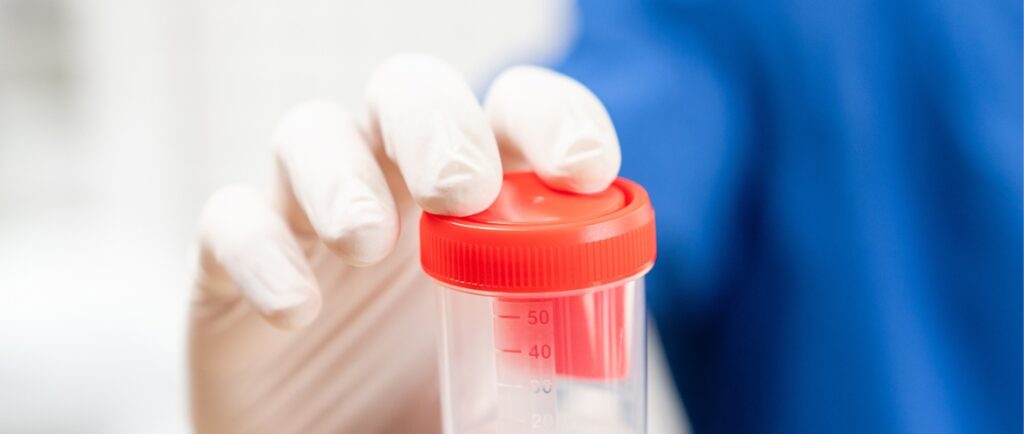
Drug tests are no fun. Even if you haven’t taken any illegal drugs, you can still have that uneasy feeling of “Did I make a mistake walking through that cloud of marijuana smoke at that party?” And if you’re taking a health supplement, like a CBD gummy or CBD tincture, it’s natural to wonder, “Does CBD show up on a drug test?”
In this article, we’ll take a look at what’s involved in drug testing (urine, hair, etc.) and if you run the risk of getting a positive drug test result when you use CBD products.
But first, let’s do a quick refresher on just what CBD is.
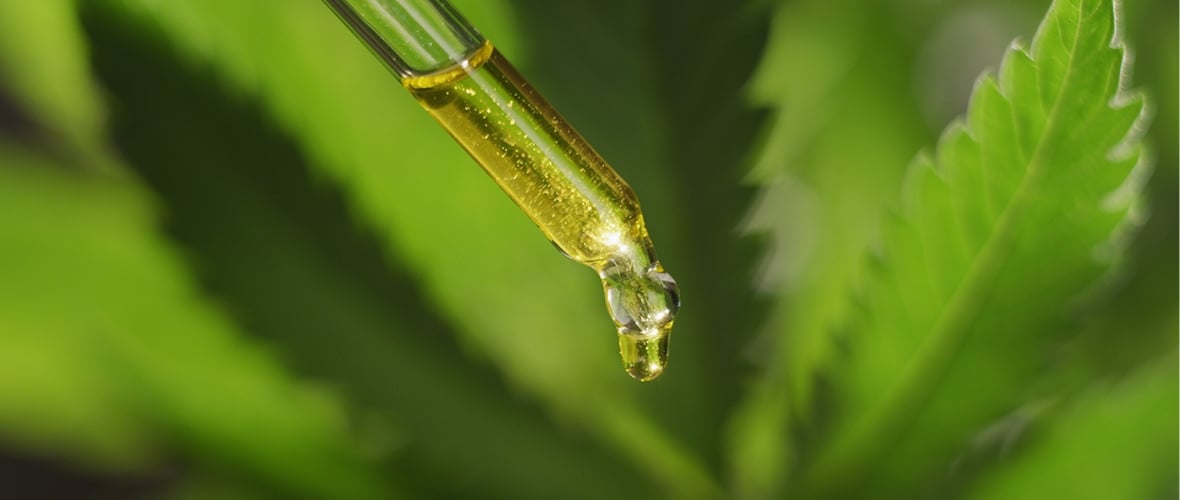
What Is CBD?
CBD, or cannabidiol, is one of several compounds found in the cannabis hemp plant, called cannabinoids. These compounds act much like a group of compounds produced naturally within the body, called endocannabinoids.
Endocannabinoids are a part of the body’s endocannabinoid system. All vertebrate animals have an endocannabinoid system. This complex network works in concert with many of the body’s other systems, including the immune system and the central and peripheral nervous systems. These systems are responsible for such functions as sleep, mood, memory, motor control, appetite, reproduction, pain, inflammation, and other crucial areas. When cannabinoids are introduced to the body, they interact with the endocannabinoid system, often bolstering that system’s ability to regulate these various functions.**
CBD is one of two major cannabinoids found in the cannabis plant, with the other being THC (tetrahydrocannabinol). THC is the intoxicating compound associated with marijuana, which is a cannabis plant high in THC content. CBD, on the other hand, is non-intoxicating. The CBD used in our products is not derived from cannabis marijuana plants; instead, the CBD is culled from the cannabis hemp plant, which is a form of cannabis with only trace amounts of THC (less than 0.3%). So, no. CBD will not get you high like marijuana. But it is a great health and wellness supplement with a host of potential benefits.
THC & the Different Types of CBD Oil
CBD oil is removed from the hemp plant in a variety of ways. Hemp seed oil, for instance, is derived from the seeds of the hemp plant. This oil is used primarily for skin-care products. CBD oil, on the other hand, is produced from the hemp plant’s buds, leaves and stalks. The manner in which the CBD oil is extracted and filtered can result in different types of CBD oil: full spectrum CBD, broad spectrum CBD, and CBD isolate.
Full Spectrum CBD
When CBD oil extraction is made in a single pass, the resulting CBD extract is called full-spectrum CBD oil. This CBD oil contains all of the chemical compounds in the hemp plant, including all of the cannabinoids, terpenes, flavonoids, and health-friendly fatty acids. This CBD oil can contain (by law) up to 0.3% THC. We’ll get to whether this is an issue for drug testing in a moment, but for now it’s worth noting that this is likely not enough THC to get you high. Full-spectrum CBD products are among our most popular products, and include such favorites as CBD Soft Gel Capsules and CBD Oil Calming Tincture. This also includes our line of legal CBD + Delta-9 THC products, which contain full spectrum extract with added THC to take these products right up to the legal limit. Our CBD + Delta-9 THC products include THC gummies, THC oils, THC capsules, THC vape juices, and THC vape pens.
Broad-Spectrum CBD Oil
Still, many prefer no detectable levels of THC in their CBD products, and that’s why other oils are produced with less THC in them. This is done by conducting additional rounds of filtration. When these extra filtration sweeps take place, not only is the remainder of the detectable THC removed, but also some of the other cannabinoids and terpenes, as well. This CBD oil, known as broad spectrum CBD oil, still retains CBD and some of the other cannabinoids. Most CBD products are made with broad spectrum CBD, including CBD gummies, some CBD capsules, CBD edibles, some CBD tinctures, CBD topicals, and more. You should note, however, that even the tiniest traces of THC can build up over time—even with broad spectrum products. So, tread carefully even with broad spectrum CBD.
CBD Isolate
CBD isolate is created when all plant materials other than the CBD are removed from the oil. CBD isolate is 99% pure CBD, and can most often be found in some CBD vape products, where it’s important to remove the smell and taste of hemp in order to focus the senses on added flavors.
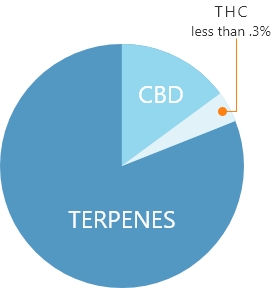
FULL SPECTRUM CBD
There are slight trace amounts of THC and other phytocannabinoids (such as terpenes), but all below the 0.3% threshold.
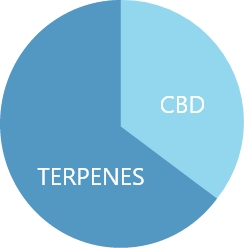
BROAD SPECTRUM CBD
THC is non-detectable; below the 0.01% threshold.
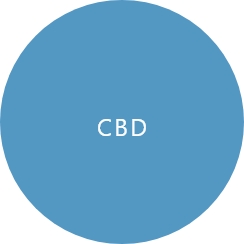
CBD ISOLATE
THC is non-detectable; below 0.002% (effectively THC-free).
ONLY BUY FROM REPUTABLE CBD COMPANIES
It’s important to know which kind of CBD is in your CBD hemp product if you might have to take a drug test. If you purchase your CBD products from a reputable company, this information can easily be found on the product label and the brand’s website. Reputable CBD companies also provide third-party laboratory reports (Certificate of Analysis, or COA) on all of their products, so that you know the exact amount of each chemical in your CBD product.
Will CBD Show Up on a Drug Test?
So, now that you’ve got a handle on what CBD is and the different kinds of CBD oils, let’s turn to the question of CBD and drug tests. That is to say, can CBD make you fail a drug test? And do different kinds of drug tests affect those results?
Types of Drug Tests
Let’s begin by pointing out that, in general, drug tests do not screen for CBD, because it is non-intoxicating and, more importantly, CBD is not a controlled substance. Drug testing, however, does screen for alcohol and drugs, like amphetamines, benzodiazepines, cocaine, opiates and, yes, cannabis.
Urine
What the tests are screening for in cannabis is THC content. It’s worth noting that 50 nanograms of THC-COOH (one of THC’s primary metabolites) per milliliter will prompt a positive drug urine test. Urine drug tests are very common in workplace drug screenings. And while there is minimal THC in CBD oil, there can be enough — particularly, in full spectrum CBD — to create a false positive. This is more likely to happen if you consume a lot of full spectrum CBD.
Hair
Hair testing is uncommon, but some employers will use it because it can detect THC down to one picogram per milligram. A picogram, by the way, is roughly one trillionth of a gram. THC metabolites can be detectable by hair test for upwards of 90 days.
Blood
Blood tests are less common in workplaces than, say, urine tests, because workplaces are generally more interested in detecting habitual drug use. Blood cycles out THC fairly quickly, so these tests are better for detecting drugs at the time of impairment. So, police will often use this type of drug test.
In states where cannabis is not legal, any THC content is considered a positive test result. In states where cannabis is legal, the line is drawn between one and five nanograms per millimeter, depending on the state. Consult your local state law enforcement agency for more information.
Saliva
Saliva testing isn’t commonly used. It can detect THC for roughly 72 hours after consumption, perhaps longer for habitual use. There aren’t any established cutoff limits for detecting THC via saliva drug test, though four nanograms per milligram is a probable standard.
The safe move for all of these tests is to steer away from full spectrum CBD if you have a drug test coming up. It’s highly unlikely that broad spectrum CBD, if taken sparingly, would show up on a drug test. Products with CBD isolate should be even more safe.
| Type of Drug Test | THC Detectable |
| Urine | Up to 3 days (6 weeks with heavy usage) |
| Hair | Up to 90 days |
| Blood | Up to 7 days |
| Saliva | Up to 24 hours |
Ingesting or inhaling products that contain hemp derived delta-9 THC could result in the consumer failing a drug test for THC (Tetrahydrocannabinol).
Drug Testing Basics: How Long Does CBD Stay in Your System?
Determining the amount of time CBD stays in your system can be tricky. Everyone has a different metabolism, so there is no all-encompassing answer. American Family Physician reports that cannabis can be detected, via urine test, three days after a single use and more than 30 days after heavy usage. So, don’t count on anything flushing out of your system right away.
Worried About a Positive Test Result for THC?
To sum up, if you’re concerned about whether a product with CBD will cause a positive result on a drug test, there are a couple of things you can do for peace of mind. Use CBD products with non-detectable amounts of CBD: CBD isolate being the safest bet. And be mindful not to overuse CBD. You may be surprised to discover that, in some people, only a small dose of CBD is needed to produce desired effects. Make sure that the product you use comes with a third-party lab test to corroborate the amount of THC content in the product. And lastly, if you do think you might have consumed enough THC to tip off a drug test, then be aware that it can remain in your system, potentially for a long time, depending on the amount you’ve taken.
And if, after all of this, you somehow test positive for marijuana despite only consuming legal CBD, keep the packaging of your CBD product handy to show your employer. Honesty and transparency are always a good idea.
- Raypole, Crystal. “A Simple Guide to the Endocannabinoid System.” Healthline.com, https://www.healthline.com/health/endocannabinoid-system. 17 May 2019.
- Holland, Kimberly. “CBD vs. THC: What’s the Difference?” Healthline.com, https://www.healthline.com/health/cbd-vs-thc. Updated 20 July 2020.
- Ferguson, Sian. “Hemp vs. Marijuana: What’s the Difference?” Healthline.com, https://www.healthline.com/health/hemp-vs-marijuana. 27 August 2020.
- Brico, Elizabeth. “We Looked Into Whether CBD Would Show Up in a Drug Test.” Vice, https://www.vice.com/en/article/xwjmpj/cbd-drug-test. 14 December 2018.
- Caporuscio, Jessica. “Can CBD Make You Fail a Drug Test?” Medical News Today, https://www.medicalnewstoday.com/articles/does-cbd-show-up-on-a-drug-test. 12 June 2020.
- Vandergriendt, Carly. “Does CBD Show Up on a Drug Test?” Healthline.com, https://www.healthline.com/health/does-cbd-show-up-on-a-drug-test. 24 April 2019.
- Kulig, Ken. “Interpretation of Workplace Tests for Cannabinoids.” Journal of Medical Toxicology, https://www.ncbi.nlm.nih.gov/pmc/articles/PMC5330962/. 29 September 2016.
- Standridge, John B.; Adams, Stephen M.; Zotos, Alexander P. “Urine Drug Screening: A Valuable Office Procedure.” American Family Physician, https://www.aafp.org/afp/2010/0301/p635.html. 1 March 2010.







